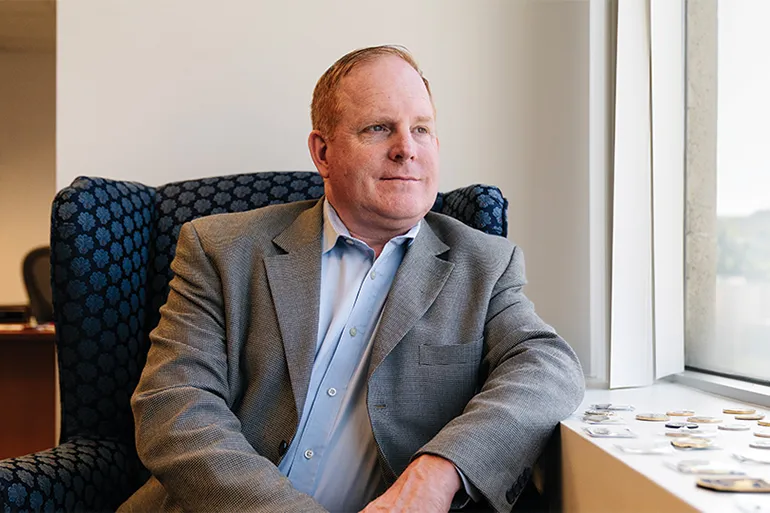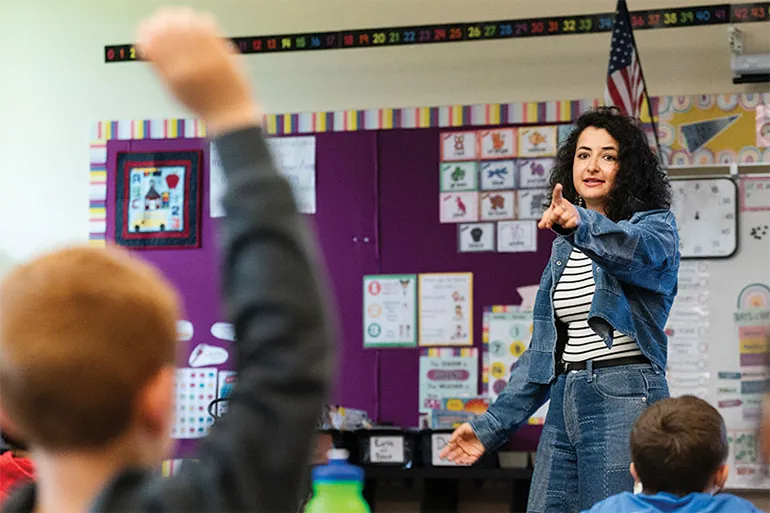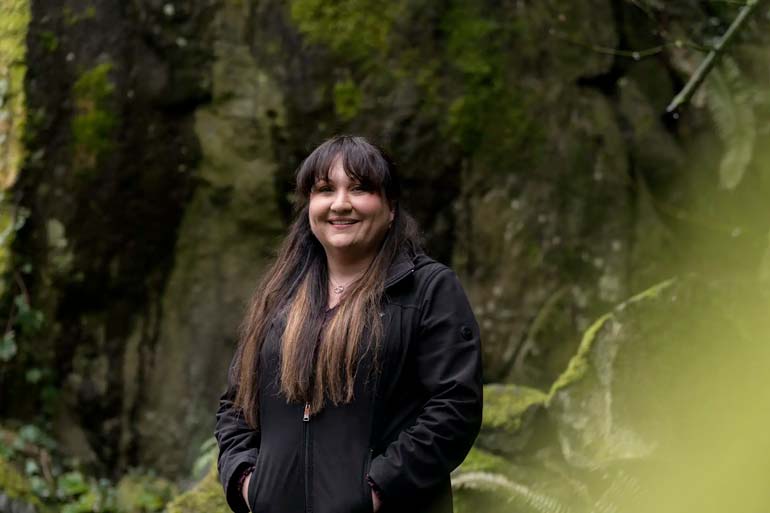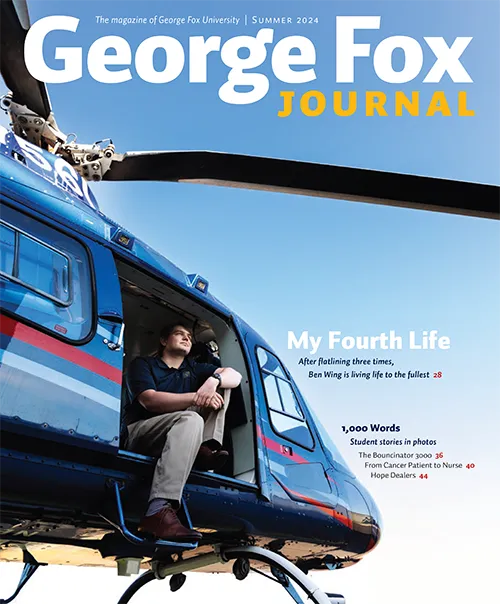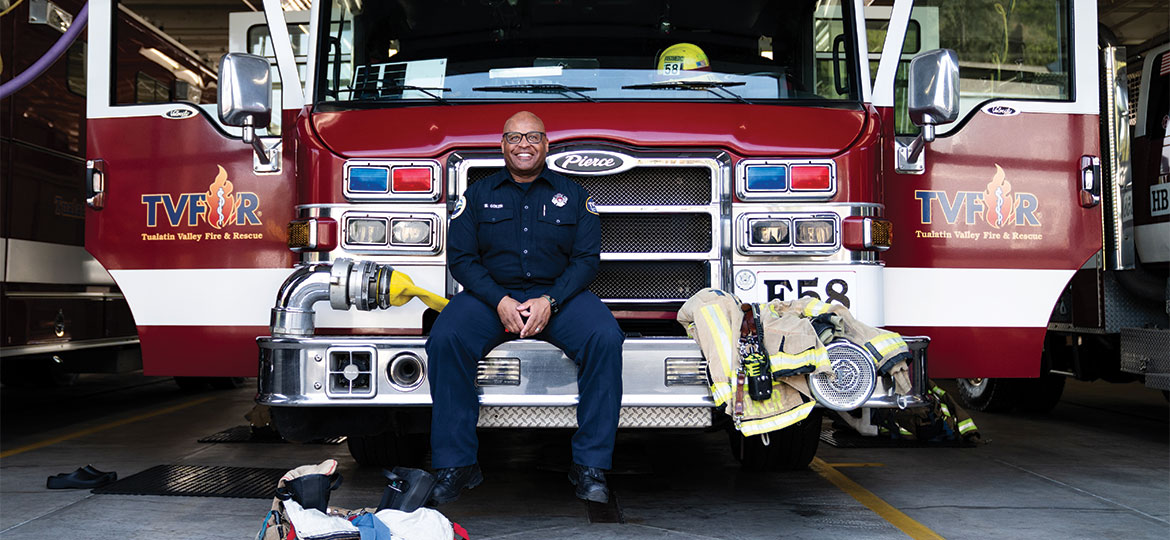
Creating Safety for a Vulnerable Humanity
Whether it’s a broken arm or a broken heart, Will Coker is ‘all in’
Flames stretched up to 30 feet in the air from underneath the upturned car, which had skidded to a stop alongside the highway.
“You’re fire attack,” Will Coker’s (M19) lieutenant shouted over the noise as the fire engine screeched to a halt. The report said the car had rolled over with a 16-year-old driver and two passengers inside.
Leaping out of the truck, Coker hustled past pedestrians on the street. Out of the corner of his eye, he spotted an Air Jordan shoe in the middle of the roadway, and to his right, a young woman was screaming, “You have to get him out of there!”
Coker stood in front of the vehicle and began to douse the fire, but something caught his attention: a pair of human legs, trapped beneath the bumper, not moving. He grimaced, but could only continue to mitigate the fire.
A few months later, Coker received a call from the mental health counselor at his station, informing him that the mother of the boy he saw under the car would like to speak with one of the first responders on the scene that day.
Without hesitation, Coker volunteered, and he found himself in their family living room.
Coker started the conversation as he does with every scene he responds to. “Hi, my name is Will,” he said. “What’s your name?”
The boy’s mother introduced herself, and between sips of tea, she explained that she didn’t want to know more about the accident. After sharing a bit about her own life, she asked what she truly wanted to know – she wondered if Coker could feel her son.
“I had to ponder and rethink what she was asking,” he says now, recalling the conversation. “I didn’t have any physical contact with her son – I wasn’t part of the crew that extricated and removed his remains, so I never physically touched him – but that wasn’t what she was asking. She was asking if I felt his spirit.”
As Coker considered his reply, he thought about the calm, empty silence of the highway after the patients had been transported away. He pictured how the tall grass swayed in the wind, lit up by blue and red flashes from the emergency lights.
“He’s at peace,” he told her after a few moments. Although Coker could not physically save her son, he hoped that listening to her story and sharing authentic empathy would bring her some comfort.
Later in life, Coker would need similar support during his own time in counseling.
In the summer of 2001, Coker enlisted in the Oregon Army National Guard after he saw the second plane hit the World Trade Center. He was well-respected by his team, and recalls frequently being woken up at night by his peers to help calmly resolve interpersonal conflicts between soldiers.
Later, in May of 2009, he was deployed to Iraq as a first lieutenant, where he served until April of 2010. While Coker loved serving his country, this unfortunately meant missing the first year of his son’s life. He also experienced a lot of loss during his time in battle, which weighed heavily on him.
Shortly after he returned home, after another argument, his wife told him he was acting differently.
“She was right,” he says. “I was suffering, but I was in denial. I wasn’t ready to deal with it.”
It took several years for Coker to eventually seek help for the battle fatigue and post-traumatic stress he was experiencing, but once he did, “I came back amazed,” he says.
After Coker got the help he needed, he questioned his initial denial and negative response to the idea of counseling. His curiosity brought him back to something he had previously considered – graduate school. He wondered why he was so averse to seeking help, and if he could learn to help others like him overcome that fear.
That is why he decided to earn his master’s degree in marriage, couple and family counseling, and why he enrolled at George Fox in the fall of 2016.
“George Fox intentionally helps you unpack and understand your story of trauma and heartbreak, no matter what that is,” he says. “We are all dealing with something that nobody else knows about.”
Coker graduated with his degree and a certificate in traumatology in December of 2020.
Today, he sees clients for counseling on Mondays and Wednesdays, both at Fir Counseling in McMinnville, Oregon, and through his own counseling service, First Responder Families. In addition, Coker works 10 to 14 shifts per month as a firefighter paramedic.
“I have been given a very special front-row seat for life and death on planet earth,” Coker says. While this often comes with difficult conversations, he says, “We can take hard news.”
In less than two years, Coker’s time as a firefighter paramedic will come to a close, and he will focus on counseling full time. “It is so special to enter into a unique space, to share the worst news with another human being, but to do that work as gently, as compassionately, as genuinely and authentically as humanly possible, so that the next stage of their life can begin,” he says.
In all of Coker’s positions, he aims to emphasize, “I see you, I hear you, I care and I understand” – four statements that help others feel validated, which he learned from professor Daniel Sweeney during his time at George Fox.
Looking for more?
Browse this issue of the George Fox Journal to read more of the stories of George Fox University, Oregon's premier Christian university.




